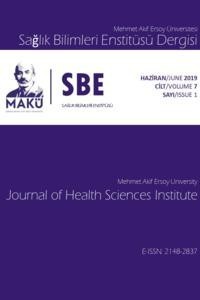Türkiye’deki bal örneklerinde neonikotinoid varlığının LC-MS/Q-TOF yöntemi ile tespiti
Türkiye’deki bal örneklerinde neonikotinoid varlığının LC-MS/Q-TOF yöntemi ile tespiti
Bal, LC-MS Q-TOF, Neonikotinoid,
___
- Anastassiades, M., Lehotay, S. J., Štajnbaher, D., Schenck, F. J. 2003. Fast and easy multiresidue method employing acetonitrile extraction/partitioning and “dispersive solid-phase extraction” for the determination of pesticide residues in produce. Journal of AOAC international 86(2), 412-431.
- Bonmatin, J. M., Giorio, C., Girolami, V., Goulson, D., Kreutzweiser, D. P., Krupke, C., Liess, M., Long, E., Marzaro M., Mitchell E.A.D., Noome, D. A., Simon-Delso, N., Tapparo, A. 2015. Environmental fate and exposure; neonicotinoids and fipronil. Environmental Science and Pollution Research 22(1), 35-67.
- CEN - EN 15662, 2018. Foods of plant origin - Multimethod for the determination of pesticide residues using GC- and LC-based analysis following acetonitrile extraction/partitioning and clean-up by dispersive SPE - Modular QuEChERS-method. Cicero, N., Naccari, C., Cammilleri, G., Giangrosso, G., Cicero, A., Gervasi, T., Ferrantelli, V. 2017. Monitoring of neonicotinoid pesticides in beekeeping. Natural product research 31(11), 1258-1262.
- Codling, G., Al Naggar, Y., Giesy, J. P., Robertson, A. J. 2016. Concentrations of neonicotinoid insecticides in honey, pollen and honey bees (Apis mellifera L.) in central Saskatchewan, Canada. Chemosphere 144, 2321-2328.
- Decourtye, A., James D. 2010. Insect nicotinic acetylcholine receptors. In: Thany, S. H. (eds) Ecotoxicity of neonicotinoid insecticides to bees. Springer, New York, pp. 85-95.
- European Commission, 2020. Neonicotinoids. https://ec.europa.eu/food/plant/pesticides/approval_active_substances/approval_renewal/neonicotinoids_en (Erişim 27.02.2020).
- Gbylik-Sikorska, M., Sniegocki, T., Posyniak, A. 2015. Determination of neonicotinoid insecticides and their metabolites in honey bee and honey by liquid chromatography tandem mass spectrometry. Journal of Chromatography B 990, 132-140.
- Jovanov, P., Guzsvány, V., Lazić, S., Franko, M., Sakač, M., Šarić, L., Kos, J. 2015. Development of HPLC-DAD method for determination of neonicotinoids in honey. Journal of Food Composition and Analysis 40, 106-113.
- Keyvan, E., Yurdakul, O., Kocasari, F., Tutun, H., Demirtaş, A., Kahraman, H. A., Şen, E. 2018. Detection of ochratoxin A in bulk tank milk. Kocatepe Veteriner Dergisi 11(3), 255-259.
- Lehotay, S. J., Maśtovská, K., Lightfield, A. R., 2005. Use of buffering and other means to improve results of problematic pesticides in a fast and easy method for residue analysis of fruits and vegetables. Journal of AOAC Inter 88(2):615-629.
- Lu, C. A., Chang, C. H., Tao, L., Chen, M. 2015. Distributions of neonicotinoid insecticides in the Commonwealth of Massachusetts: a temporal and spatial variation analysis for pollen and honey samples. Environmental Chemistry 13(1), 4-11. Main, A. R., Headley, J. V., Peru, K. M., Michel, N. L., Cessna, A. J., Morrissey, C. A. 2014. Widespread use and frequent detection of neonicotinoid insecticides in wetlands of Canada's Prairie Pothole Region. PloS one 9(3).
- Mitchell, E. A., Mulhauser, B., Mulot, M., Mutabazi, A., Glauser, G., Aebi, A. 2017. A worldwide survey of neonicotinoids in honey. Science 358(6359), 109-111.
- PMRA, 2015. Pesticide Incident Reporting Database. Health Canada Pest Management Regulatory Agency. http://pr‐rp.hc‐sc.gc.ca/pi‐ip/disclaimer‐avertissement‐eng.php (Erişim 27.02.2020)
- Proietto Galeano, M., Scordino, M., Sabatino, L., Pantò, V., Morabito, G., Chiappara, E., Gagliano, G. 2013. UHPLC/MS-MS analysis of six neonicotinoids in honey by modified QuEChERS: method development, validation, and uncertainty measurement. International journal of food science 2013.
- Sánchez-Hernández, L., Hernández-Domínguez, D., Bernal, J., Neusüß, C., Martín, M. T., Bernal, J. L. 2014. Capillary electrophoresis–mass spectrometry as a new approach to analyze neonicotinoid insecticides. Journal of Chromatography A 1359, 317-324.
- Sánchez-Hernández, L., Hernández-Domínguez, D., Martín, M. T., Nozal, M. J., Higes, M., Yagüe, J. L. B. 2016. Residues of neonicotinoids and their metabolites in honey and pollen from sunflower and maize seed dressing crops. Journal of Chromatography A 1428, 220-227.
- Tanner, G., Czerwenka, C. 2011. LC-MS/MS analysis of neonicotinoid insecticides in honey: methodology and residue findings in Austrian honeys. Journal of agricultural and food chemistry 59(23), 12271-12277.
- Zhang, Q., Li, Z., Chang, C. H., Lou, J. L., Zhao, M. R., Lu, C. 2018. Potential human exposures to neonicotinoid insecticides: a review. Environmental pollution 236, 71-81.
- ISSN: 2148-2837
- Yayın Aralığı: Yılda 3 Sayı
- Başlangıç: 2013
- Yayıncı: Burdur Mehmet Akif Ersoy Üniversitesi
Toxicity of Ortho-Phenylphenol (OPP) and Sodyum Ortho-Phenylphenate (SOPP)
Selinay Başak ERDEMLİ KÖSE, Fatma KOCASARI
Türkiye’deki bal örneklerinde neonikotinoid varlığının LC-MS/Q-TOF yöntemi ile tespiti
Güzin İPLİKÇİOĞLU ÇİL, Seda Dicle KORKMAZ, Görkem CENGİZ, Özlem KÜPLÜLÜ
Seroprevalance of Chlamydophila abortus infection in goats in Burdur province
